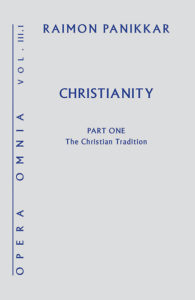
Opera Omnia Vol. III: Christianity, Part One: The Christian Tradition
Raimon Panikkar. Opera Omnia Vol. III: Christianity, Part One: The Christian Tradition. Maryknoll, New York: Orbis. 2015. pp. 370. $90.00 (cloth).
Reviewed by John M. Allison
The Christian Tradition is the latest addition to the compilation of pluralist theologian Raimon Panikkar’s (1918-2010) completed works. This is a difficult book to summarize – and that is not only because Panikkar’s project is unapologetically cosmic in scope. The volume covers over a decade of intellectual development and is comprised of nine separate works: six articles, two lectures, and one book (1961’s Humanismo y Cruz, which itself consists of a series of ten articles and lectures from 1948-1961). Suffice to say, then, that it would be a vain undertaking to attempt to condense Panikkar’s reflections on Christianity with any adequacy or depth here.
The following may, however, be offered: one of the values of this work is that it offers us a glimpse into the development of Panikkar’s thought leading up to his first major publication, The Unknown Christ of Hinduism (1964), which was an adaptation of his Ph.D. thesis in theology. As such, Christian Tradition gives us insight into Panikkar’s roots as he comes into the mature stage of pioneering a pluralist theology. The volume is worth the price of admission for this alone. Moreover, despite its language feeling sometimes outdated – something Panikkar himself admits (xxii) – his youthful thinking here retains a freshness that is characteristic of all original thought. Indeed, it may be remarked that the quality of every great work of literature is that it less addresses itself less to a known audience as much as it creates its audience upon debut. This certainly is the case with Christian Tradition, which showcases a younger Panikkar beginning to articulate and shape his own unique understanding of the world. From his musings on science to his reflections on individualism and anthropology, and from his exploration of salvation to his thoughts on monasteries, there is something irreducibly his own on every page. This is not an idle observation. Rather, it is a recognition of Panikkar’s own insistence that there is something intrinsically “autobiographical” (p. v) to all theologizing – something he reiterates throughout the volume. Christian Tradition contains not just the reflections of an academic theologian. It is so much more than that, representing the fruits of a deeply spiritual personality coming to terms with no less than a unique pluralistic vision of Christianity’s relationship to reality as a whole. In this light, we can appreciate that each essay is a theoretical-existential experiment in spiritual practice – a hybrid of both speculation and praxis. Christian Tradition is less united in content (though it certainly is about “the Christian tradition” most generally) than it is united by experimental form.
Reading Panikkar, one may ultimately come to sense that he was proverbially “ahead of his time.” Perhaps his way of theorizing and practicing interreligious pluralism has much yet to teach us. Indeed, wrestling with him today, Panikkar’s work strikes one less as a relic of outdated thinking (a common sentiment in some theology of religion circles) but rather its potential future. We see the seeds of that potential germinating here in this volume.
John M. Allison, MDiv Student, Princeton Theological Seminary
